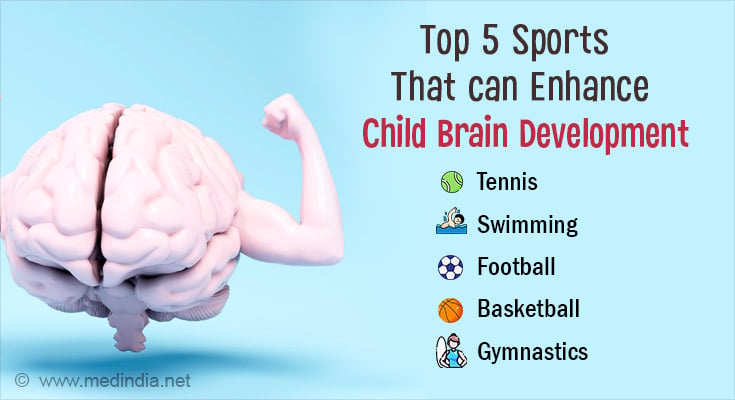- Playing sports can foster memory, problem-solving, and creativity
- Each sport offers unique cognitive challenges, shaping essential skills beyond physical fitness
- Engaging in sports nurtures holistic brain development in children
Forget the days when child development solely focused on report cards. Today, we recognize the importance of holistic growth, nurturing both physical fitness and the brainâs cognitive abilities. In this arena, sports shine brightly. They offer a unique playing field where children can not only develop strong bodies but also cultivate powerful minds (1✔ ✔Trusted Source
Effects of tennis play on executive function in 6-11-year-old children: a 12-month longitudinal study
).
Playing tennis enhance problem-solving skills and creativity in children? #tennisbrains #playtogrow #medindia’
Advertisement
The Cognitive Benefits of Sports
We will explore five exceptional sports by stating their surprising impact on brainpower and will go beyond the physical benefits to reveal how these activities become training grounds for essential cognitive skills that kids can use throughout life.
By understanding these cognitive advantages, parents, educators, and coaches can make informed choices about incorporating physical activities that support childrenâs well-rounded development. Each sport presents unique challenges and rewards, shaping young minds in distinct ways. From the strategic chess match of tennis to the laser focus demanded by gymnastics, these activities cultivate skills that extend far beyond the victory lap.
Advertisement
This article isnât just about getting active; itâs about highlighting the immense potential of sports to nurture young minds. Letâs explore the cognitive benefits and developmental impacts of each sport, revealing why theyâre not just fun pastimes, but powerful tools for building strong, intelligent minds (2✔ ✔Trusted Source
Children’s Involvement in Different Sport Types Differentiates Their Motor Competence but Not Their Executive Functions
).
Advertisement
How Each Sport Shapes Essential Cognitive Skills
Engaging in sports like tennis, swimming, football, basketball, and gymnastics can foster memory, problem-solving skills, attention span, creativity, and executive function. Letâs see how each of these sports contributes to the holistic
How Sports Can Improve Cognitive Development Among Children
).
Tennis: Enhancing Cognitive Flexibility and Strategic Thinking
Tennis demands keen observation and adaptability, which are essential skills in sports and everyday life. Playing single and a three or five sets match requires physical endurance and practice. Mastering tennis requires recognizing opponentsâ weaknesses and adjusting strategies accordingly fosters cognitive flexibility. Furthermore, the sport sharpens hand-eye coordination, reaction time, and decision-making abilities. These skills translate into improved problem-solving and strategic thinking outside the court.
Extensive research was done on tennis and its link with child brain devolpment, indicating its one of the best sports for the child. According to the recent study, tennis enhances devolpment of executive functions such as working memory, cognitive flexibility.
Swimming: Boosting Attention Span and Memory
Swimming is not just a life-saving skill but also a brain booster. The rhythmic nature of swimming enhances cardiovascular health, leading to better blood flow to the brain. This increased blood flow boosts attention span, memory retention, and cognitive function. The sport also promotes spatial awareness and overall mental focus, which are fundamental for academic performance.
Football: Building Teamwork and Executive Function
Football is renowned for fostering teamwork, coordination, and endurance. The strategic nature of the game sharpens decision-making skills and cognitive functions. Research suggests that football can enhance executive function, such as goal-setting and problem-solving, due to its fast-paced, cooperative gameplay. Moreover, the social aspect of football encourages healthy relationships and a sense of unity, positively impacting emotional well-being.
Basketball: Enhancing Hand-Eye Coordination and Focus
Basketball is a high-energy sport that hones hand-eye coordination, agility, and precision. Dribbling and shooting hoops require good concentration, which enhances focus and attention span. Moreover, the fast-paced nature of basketball stimulates neurotransmitter production, promoting cognitive development. Strategic thinking, quick decision-making, and creativity are all integral to the sport, contributing to holistic brain growth.
Gymnastics: Developing Discipline and Balance
Gymnastics is not just about physical prowessâit teaches discipline, perseverance, and self-expression. The intricate movements and balance exercises enhance spatial awareness and body control, which are vital for overall cognitive development. Setting and achieving gymnastic goals build resilience and self-esteem in children, nurturing a growth mindset beneficial in academics and personal endeavors.
Advertisement
The Winning Formula: Sports for a Brighter Future
The benefits of youth sports extend far beyond the scoreboard. Tennis, swimming, football (soccer), basketball, and gymnastics are like a winning formula for brain development. They not only sculpt strong bodies but also cultivate memory, focus, problem-solving, and creativity â skills that are essential for academic achievement and success in all aspects of life.
Remember, prioritize safety and choose activities appropriate for age and abilities. For example swimming can be introduced early and tennis can be played by kids from 5 years onwards using smaller rackets and soft ball. To play sports such as Football and Basketball, the kids may need to wait until they are a little older.
By encouraging participation in these dynamic sports, parents and educators can empower children to become well-rounded individuals with healthy bodies and agile minds, prepared to thrive in the years to come.
Engaging children in sports isnât just about burning calories; itâs about building a strong foundation for cognitive growth and life skills development.
References:
- Effects of tennis play on executive function in 6-11-year-old children: a 12-month longitudinal study – (https://pubmed.ncbi.nlm.nih.gov/29529951/)
- Childrenâs Involvement in Different Sport Types Differentiates Their Motor Competence but Not Their Executive Functions – (https://www.ncbi.nlm.nih.gov/pmc/articles/PMC9103227/)
- How Sports Can Improve Cognitive Development Among Children – (https://worldairco.org/improve-cognitive-development/)
Source-Medindia







